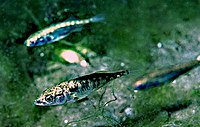
Photo from wikipedia
Ecological speciation via a host shift plays an important role in the diversification of phytophagous and parasitic insects. However, it is not clear how separation is maintained among initial populations… Click to show full abstract
Ecological speciation via a host shift plays an important role in the diversification of phytophagous and parasitic insects. However, it is not clear how separation is maintained among initial populations in which genetic separation mechanisms are not fully established. Learning‐induced host preference in females can contribute to host fidelity and result in a barrier to gene flow in the initial populations. However, the role of males, which also affects gene flow, has been largely unexplored. We examined host preference through induced learning in males, which can contribute to initial population divergence, in the parasitoid wasp, Anisopteromalus calandrae, and two host species, Callosobruchus chinensis and C. maculatus. Behavioural experiments were performed using a four‐chamber olfactometer. When wasps were conditioned during the preimaginal and early adult stage without mating experience, no preference was induced regardless of the host species. However, when wasps were conditioned at the early adult stage using the odour of the rearing host and mate reward, preference was induced in both host species. These results demonstrate mate reward learning‐induced host preference in males. Interestingly, when the rearing host species and the mating conditioning host species were interchanged, preference was induced only in males conditioned to C. maculatus at mating. Thus, depending on the host species, preimaginal and early adult learning is vital to preference induction. Our results suggest that behavioural change via learning in males plays a more important role in the ecological speciation of phytophagous and parasitic insects than previously recognized.
Journal Title: Journal of Evolutionary Biology
Year Published: 2018
Link to full text (if available)
Share on Social Media: Sign Up to like & get
recommendations!